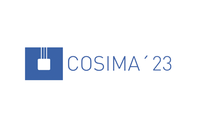Stage free for the Faculty of Engineering
COSIMA means "Competition of Students in Microsystems Applications." COSIMA is a competition for students in which new application possibilities for microsystems are to be demonstrated. The competition is organized by the German Association for Electrical, Electronic & Information Technologies (VDE) with the support of the German Federal Ministry of Education and Research.
Three teams will be supervised by chairs of the Faculty of Engineering and will compete at the MikroSystemTechnik Kongress 2023 in Dresden from October 23 to 25, 2023.
Team SolemSense: Garden probe SolemSense - energy self-sufficient and intelligent
Plants in allotments and city parks need proper care to stay alive. Here, the plant should be watered regularly and placed in an optimal location where it gets the right amount of light. Climate change further exacerbates the problem of proper watering.
The team of Prof. Dr. Peter Woias, Chair for the Design of Microsystems at the Department of Microsystems Engineering, namely students Nicolas Brugger, Uwe Benkarth and Maren Kirste, has developed a soil probe that measures temperature, soil moisture and light intensity. The data is transmitted wirelessly to a receiver unit where it is shown on a display. The system is energy self-sufficient in that it is powered by a solar cell. Thus, it does not need batteries or cables. The project is financially supported by the Gisela and Erwin Sick Foundation.
Team Intelligent Socket Mounting Handle: Mounting sockets made easy
Installing electrical outlets is sometimes very tedious because it is difficult to grip the outlet. The socket must be pressed into the wall socket against the resistance of the cables and turned straight.
Team members Solaleh Schillinger, Jonas Eschenlohr and Malte Bauer have developed a mounting handle that makes it easier to grip the socket. In addition, the mounting handle includes electronic assistance systems for aligning and screwing down the socket. The alignment of the socket is displayed via a digital spirit level. Once the socket is aligned horizontally, an electric screwdriver is automatically activated to tighten the socket. This saves electricians a lot of time and therefore money. The team members study electrical engineering at DHBW Lörrach and are supervised by Prof. Dr.-Ing. Matthias Kuhl, Laboratory for Microelectronics at the Department of Microsystems Technology, Hahn-Schickard, KIT and memetis GmbH.
Team Chewing Vibration Analysis – ChewFiit’s
The team of Prof. Dr. Oliver Amft, Chair of Intelligent Embedded Systems at the Department of Computer Science, namely students Aditi Abhijit Bongale, Ali Sarlak, Arpit Baranwall, Mohammadreza Ranaei Sharif, and Naitik Shah is developing deep learning-based algorithms to interpret body sounds on resource-limited embedded devices. Their first application target is automated dietary monitoring, which is a novel in behavior medicine to support patients in diet management programs.
Learn more about VDE GMM | COSIMA here.
Contact:
Prof. Dr. Matthias Kuhl
University of Freiburg
Department of Microsystems Engineering – IMTEK
Laboratory for Microelectronics
E-Mail: matthias.kuhl@imtek.uni-freiburg.de
Prof. Dr. Peter Woias
University of Freiburg
Department of Microsystems Engineering – IMTEK
Laboratory for the Design of Microsystems
E-Mail: woias@imtek.de
Prof. Dr. Oliver Amft
University of Freiburg
Department of Computer Science – IIF
Intelligent Embedded Systems Lab
E-Mail: amft@informatik.uni-freiburg.de
Kerstin Steiger-Merx
Representative PR/Marketing
Faculty of Engineering
University of Freiburg
Tel.: 0761/203-8056
E-Mail: steiger-merx@tf.uni-freiburg.de

